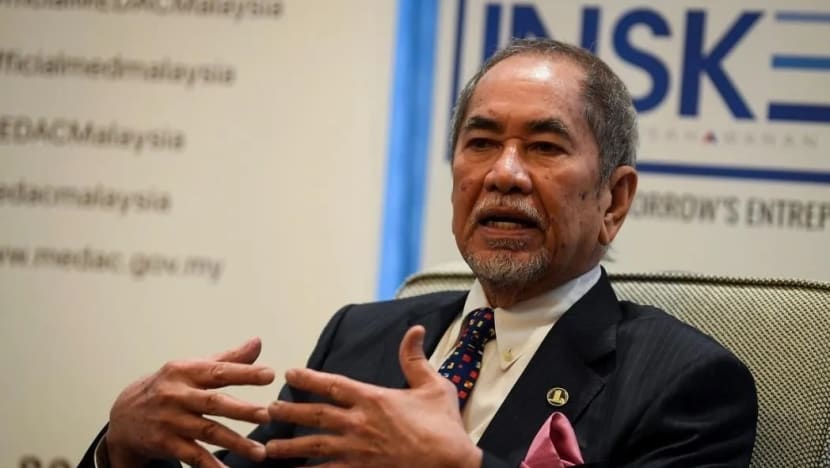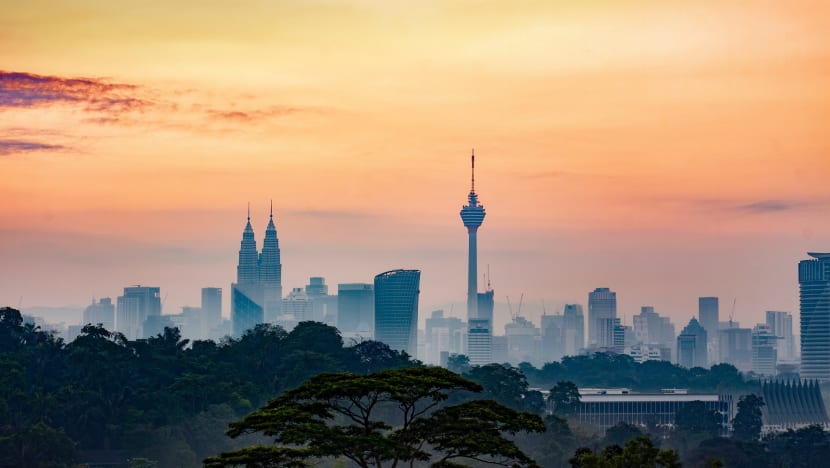CNA Explains: The Malaysian government wants to end the mandatory death penalty. Where does it go from here?

A total of 1,342 inmates are currently on death row in Malaysia. (File photo: Bernama)
KUALA LUMPUR: The Malaysian government announced last Friday (Jun 10) that it has agreed to abolish the mandatory death penalty.
Minister in the Prime Minister’s Department Wan Junadi Tuanku Jaafar explained that capital punishment would be replaced by other types of punishment at the court’s discretion.
This decision was reached following the presentation of a report on the study of alternative sentences for the mandatory death penalty during the Cabinet meeting on Jun 8.
Crimes currently punishable by death in Malaysia include murder, drug trafficking, terrorism, kidnapping and possession of firearms.
Dr Wan Junaidi, who is also the de facto law minister, added that the government will study other proposed punishments for 11 offences that currently trigger a mandatory death sentence and also 22 other offences that carry a potential death sentence at the court's discretion.
HOW DID THIS COME ABOUT?
The Malaysian government first “seriously considered” abolishing the mandatory death penalty in 2012, said Dr Wan Junaidi in his press conference on Monday.
In 2017, the parliament amended the Dangerous Drugs Act to insert Section 39B(2A), which abolished the mandatory death penalty for drug trafficking. This was later implemented officially in 2018, the minister added.
When campaigning for the 14th general election in 2018, Pakatan Harapan (PH) pledged to end mandatory death by hanging in all relevant laws.
After PH came into power, its de facto law minister, the late Mr Liew Vui Keong, was quoted in 2019 by Malaysian media as saying the government was considering several options.
These included total abolition of the death penalty, abolishing the death penalty for drug-related offences only, or to allow judges more discretion over the imposition of capital punishment.
PH, which later lost its grip on federal power, also imposed a moratorium on executions. The moratorium continues to be in place today.
On Jun 10, the Cabinet under Barisan Nasional's Prime Minister Ismail Sabri Yaakob announced that it has agreed to abolish the mandatory death penalty.
Mr Andrew Khoo, who is the co-chair of the Malaysian Bar Council’s constitutional law committee, told CNA that the announcement was in line with the country’s recent show of commitment at the international level to refrain from using the death penalty.
“Malaysia has voted twice now, in 2019 and 2021, to support the United Nations resolution for the worldwide moratorium on the use of the death penalty. And then in its campaign for a seat on the Human Rights Council for 2022-2024, the government highlighted its work in seeking to abolish the death penalty,” said Mr Khoo.
In his press conference on Monday, Dr Wan Junaidi highlighted that as of Dec 31, 2020, a total of 144 countries had abolished the mandatory death penalty and another 55 countries still maintained it.
“For those with mandatory death penalty, there really are only a few countries left. Malaysia is among the group which has not yet done it,” said Dr Wan Junaidi.
“Thank god, this government is brave enough to move forward with this, so that we are seen to be more professional, more humane and understand that there are factors that may have led to an accused committing certain crimes,” he added.
DOES THIS MEAN THERE WILL BE NO MORE DEATH PENALTY IN MALAYSIA?
In a statement last Friday, the prime minister clarified that the death penalty in Malaysia remains, but it will no longer be mandatory for some cases and judges will be given discretion when sentencing offenders.
“We are of the view that everyone deserves a second chance. If there are two options (of sentences), and if the offender is found to be a hardcore drug trafficker to the extent of causing hundreds of thousands of people to die (due to drugs), he can be sentenced to death and allowed to be sent to the gallows," Mr Ismail Sabri said, according to Bernama.
“However, if the judge, in his discretion, felt that the offender should be given a second chance and decided to sentence him to life imprisonment with whipping, he can substitute the mandatory death penalty with that life sentence."
Mr Khoo of the Malaysian Bar Council said the announcement meant that judges will now have a choice in meting out other punishments for the 11 offences, which previously carried mandatory death penalty, if the accused was found guilty.
“The judge will have a choice of either imposing the death penalty, should the death penalty still apply to that offence, or pick other options such as incarcerations, or possibly whipping. It gives the judge a choice when before he or she had no choice,” he said.
WHEN WILL THE ABOLISHMENT TAKE EFFECT?
Before the mandatory death sentence can be abolished, law amendments must first be passed through voting at the parliament’s lower house, or Dewan Rakyat, and the upper house, or Dewan Negara.
In his Monday press conference, Dr Wan Junaidi said that the Attorney-General’s Chambers are prepared to have the relevant amendments ready to be tabled in the Dewan Rakyat in October and in the Dewan Negara by December.
“So by January, we should be able to abolish the mandatory death sentence,” the minister said.

Besides the voting process at both the lower and upper houses, Dr Wan Junaidi said that the government will conduct a survey to gauge public opinion on abolishing the mandatory death sentence and the Cabinet will be told if there is strong opposition.
“We would like to hear the people’s response on the matter. If there are more in opposition than those who agree, we will bring it to Cabinet to decide,” he said.
When asked if there could be a political dimension to the Cabinet's decision, especially in light of the upcoming elections, political analyst Oh Ei Sun told CNA that it is unlikely to be an attempt to win votes.
"If you look at the opinion polls, there are more people in Malaysia supporting the death penalty than those who are opposing it. So if you are trying to get votes by abolishing the death penalty or limiting the use of capital punishment, it may not be popular," said Dr Oh, who is the principal adviser for the Pacific Research Center of Malaysia.
Mr Khoo of the Bar Council provided a similar view. "I doubt that abolition of the mandatory death penalty will be a vote-winner. It would probably be used against the government as being weak on crime and punishment," he said.
IS THIS A STEP TOWARDS TOTAL ABOLISHMENT OF DEATH PENALTY?
Anti-death penalty advocates have lauded the move to abolish the mandatory death penalty, with many expressing hope that this step will be an intermediate point in the journey where the ultimate destination is the total abolition of death penalty in Malaysia.
Lawyer and anti-death penalty activist Ngeow Chow Ying told CNA that it was a crucial first step, and that Malaysia should take the next step to abolish capital punishment in its entirety.
“We have this arbitrary sentencing scheme which has been in Malaysia for so long, and it doesn’t have any impact or serve any justice. This is a good step to finally move away from this,” opined Ms Ngeow, who is with the Anti-Death Penalty Asia Network.

Mr Khoo said that any expectations that the death penalty will be completely abolished soon has to be “tempered with realism” as many Malaysians appear to still want the death penalty to be meted out as punishment for some criminal offences.
“There are religious and cultural conservatives who feel that the mandatory death penalty needs to be retained,” he said, adding that these people want to pre-empt the possibility of an eventual abolition of the death penalty.
“We will have to progressively and gradually engage with those segments of society which still want to retain the death penalty in the journey towards total abolition,” he added.
WHAT ABOUT CRIMINALS CURRENTLY ON DEATH ROW?
Dr Wan Junaidi said that the 1,342 convicts in Malaysia who are currently on death row will continue to have their sentences upheld until further notice.
The government would form a tribunal to review their sentences, he added.
“Apart from discussing alternative forms of punishment, we decided that sentencing for the 1,342 individuals sentenced to death while discussions were done on the abolishment of the mandatory death penalty will remain,” he was quoted as saying by Malay Mail.
“This will stay as is until amendments to the law or we abolish the mandatory death penalty altogether,” added the minister.
Ms Ngeow, the anti-death penalty activist, said these death row inmates should be given the benefit of resentencing, but she acknowledged that there could be constitutional challenges given that they have already been sentenced.
“Another challenge is that once the mandatory death penalty is removed, it has to be replaced with alternative punishments such as imprisonment. So the number of years et cetera has to now be decided by the government in the Penal Code,” she added.
















